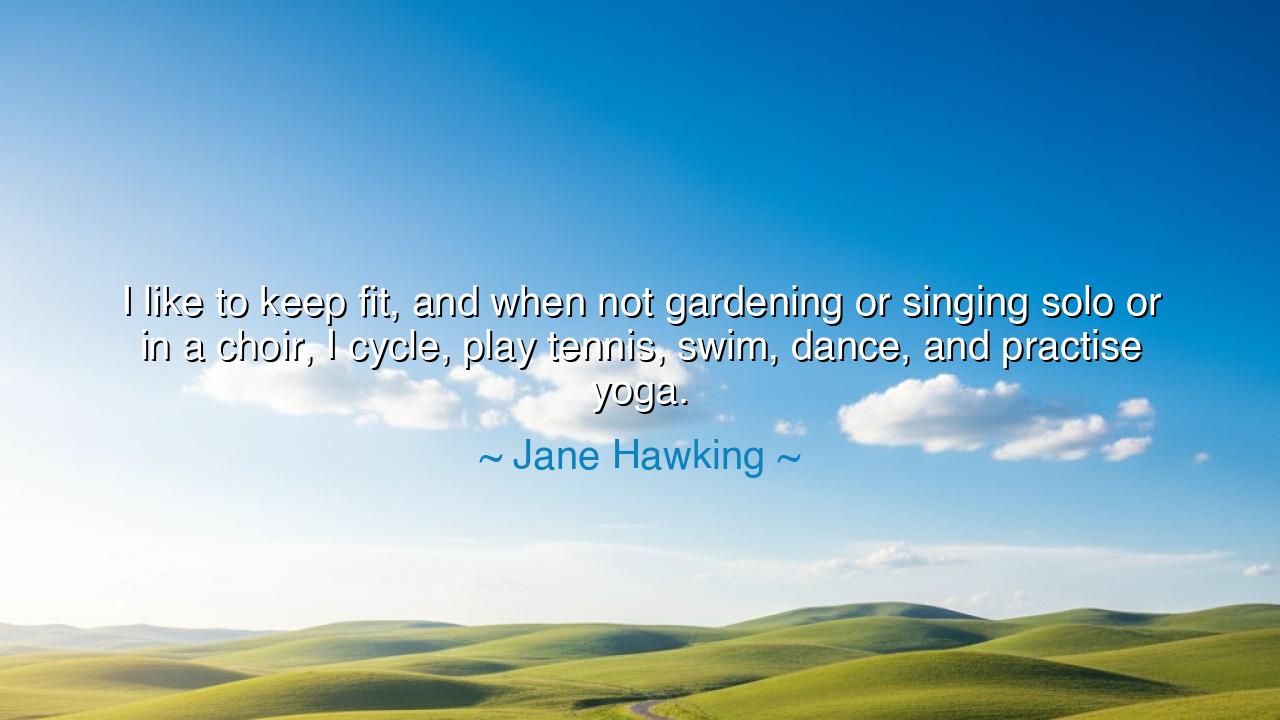
I like to keep fit, and when not gardening or singing solo or in
I like to keep fit, and when not gardening or singing solo or in a choir, I cycle, play tennis, swim, dance, and practise yoga.






The words “I like to keep fit, and when not gardening or singing solo or in a choir, I cycle, play tennis, swim, dance, and practise yoga” were spoken by Jane Hawking, the writer, educator, and first wife of the renowned physicist Stephen Hawking. In this simple yet radiant declaration, she offers more than a list of pastimes — she reveals a philosophy of balance, a way of living that honors the harmony between body, mind, and spirit. These are not the words of idle leisure but of a woman who, through trial and perseverance, discovered that strength must be cultivated both within and without, and that movement is the soul’s quiet celebration of being alive.
Jane Hawking’s life was one of extraordinary challenge and grace. While the world celebrated her husband’s towering intellect, she bore the invisible labor of care — raising children, managing a household, and supporting a man whose brilliance was shadowed by illness. In the midst of such demands, she did not surrender her own vitality. The gardening, singing, cycling, and yoga became her way of returning to herself — of grounding her body and rekindling her joy. Thus, when she speaks of keeping fit, she speaks not only of muscle and endurance, but of resilience, the inner strength that allows one to bear the weight of life with dignity and grace.
Her love for gardening reveals the patience and reverence of the soul that tends both earth and heart. To work with soil and seed is to practice faith — the belief that beauty will rise again, even after winter. Her singing, whether solo or in a choir, reminds us that the voice, when lifted in harmony, becomes an act of communion. It unites the individual spirit with something greater — a chorus of existence itself. And the acts of cycling, swimming, dancing, and yoga speak to the ancient truth that movement is medicine — that the body, when honored, becomes the instrument of freedom and peace.
In the ancient world, such balance was revered. The Greeks spoke of kalokagathia, the harmony of physical excellence and moral virtue. The sages of the East taught that yoga — meaning union — was not merely exercise but the joining of the finite self with the infinite. Even the philosophers of Rome, such as Seneca and Marcus Aurelius, urged that a well-trained mind must dwell within a well-tended body. Jane Hawking’s modern life embodies this timeless wisdom. She shows that intellect alone cannot sustain the soul, and that even in the shadow of genius, the simple acts of care — of moving, breathing, and creating beauty — keep the flame of life bright.
Her story recalls others who found solace and strength in the rhythm of physical practice. Mahatma Gandhi, though frail in frame, walked miles each day, believing that motion brought clarity to thought. Beethoven, when overcome by deafness and despair, walked the countryside for hours, composing symphonies in his heart. These men, like Jane Hawking, understood that the body is the vessel of the soul, and that to move is to honor life’s divine current. Through such movement, the spirit remembers its freedom, even when burdened by suffering or duty.
The deeper meaning of Jane’s words lies in their integration of joy and discipline. Her list of activities is not random but rhythmic — a dance between solitude and fellowship, rest and motion, contemplation and expression. In gardening and yoga, she finds stillness; in singing and dancing, she finds release. In this balance lies wisdom: that life’s beauty is not in perfection, but in participation — in the willingness to meet each day with both strength and softness, work and wonder.
The lesson is as enduring as it is gentle: to live well, one must care for the whole self. The mind must be nourished by thought, the heart by art, and the body by movement. To neglect one is to weaken all.
Practical actions: Each day, move with intention. Walk, breathe, stretch, or dance — not for achievement, but for gratitude. Spend time in nature, tending to something that grows. Sing, even if only to yourself. Let your life become a harmony of action and reflection. For as Jane Hawking reminds us, strength is not the absence of struggle, but the art of renewal, and the soul that honors its body will never lose its light.






AAdministratorAdministrator
Welcome, honored guests. Please leave a comment, we will respond soon